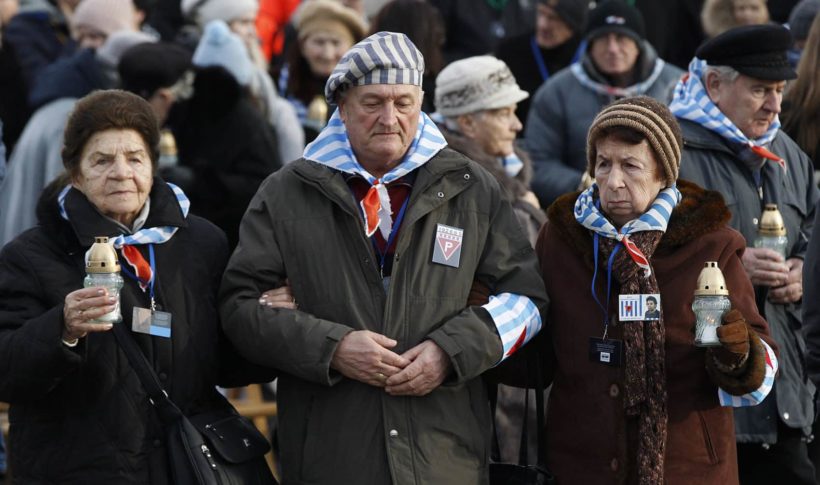Poland: Memorial held at Auschwitz on International Holocaust Remembrance Day

On International Holocaust Remembrance Day on Sunday, a group of survivors, politicians and foreign dignitaries marked International Holocaust Remembrance Day in a ceremony at Auschwitz, that once housed the largest Nazi death camp.
Dozens of former prisoners, priests and staff of the Auschwitz Memorial laid wreaths at the former German Nazi concentration and extermination camp to commemorate the 74th anniversary of the camp’s liberation, on January 27, 1945.
They reunited at the so-called “wall of death” at Auschwitz Memorial’s Block 11, against which Nazis executed thousands of prisoners. The main commemoration event was held at the camp’s “central sauna,” where new inmates were stripped, had their heads shaved and were tattooed with a number on their arms by Nazis guards. Prayers and tributes were paid at the Monuments of the Victims.
Polish president Andrzej Duda and Prime Minister Mateusz Morawiecki attended the ceremonies.
The Auschwitz Birkenau camp operated from 1940 until its liberation by the [Soviet] Red Army on January 27, 1945. Until the liberation, German Nazis murdered approximately 1.1 million people in Auschwitz, mostly Jews, but also Poles, the Roma, Soviet prisoners of war and people of other nationalities. The camp was declared a national memorial site in 1947.
For the world today, Auschwitz is a symbol of the Holocaust and atrocities of Hitler during World War II. January 27 was adopted as the International Holocaust Victims Remembrance Day by the United Nations in 2005. According to the UN, the purpose of this is not only to remember the victims of the Holocaust but also to promote the education of the Holocaust throughout the world.
On January 23, the European Union Parliament held a ceremony in Brussels to mark the upcoming International Holocaust Remembrance Day. European Parliament President Antonio Tajani of Italy, Prime Minister of Romania Viorica Dăncilă and Chair of the Jewish Agency Issac Herzog commemorated the victims of the Holocaust.
“The Eurobarometer published yesterday that 50% of the Europeans see antisemitism as a problem in their country,” said Tajani as he opened the ceremony. “This is unacceptable for us. We must act and react, we must reach out to citizens, in particular, the young people. They are the future of Europe. Our schools and universities should not only provide skills and knowledge. They should teach the importance of solidarity, freedom and respect for human dignity.”
[President Trump added to the chorus of voices decrying the Holocaust on Sunday. In his “Message on International Holocaust Remembrance Day” he wrote:
“To remember these men and women — those who perished and those who survived — is to strive to prevent such suffering from happening again. Any denial or indifference to the horror of this chapter in the history of humankind diminishes all men and women everywhere and invites repetition of this great evil.”].
This year’s anniversary comes amid growing concern among survivors and world leaders alike that the Holocaust has begun to slip from international, collective memory — particularly among younger generations. In remarks both before and on the day of the anniversary, leaders also lamented recent spikes in hate-inspired violence.
According to a poll released Sunday by The Holocaust Memorial Day Trust, five percent of adults in the United Kingdom don’t believe the Holocaust happened, and 64 percent either don’t know the number of Jews murdered or underestimate that number.
In a recent op-ed for the newspaper Die Welt, Germany’s foreign affairs minister, Heiko Maas, wrote that with fewer people directly connected to the past, Germany must continue to teach its young people about the Holocaust.
The UK Daily Mail reports that over the past year, Germany has seen a rising number of often violent attacks against Jews carried out by neo-Nazis and Muslims, prompting the government to appoint a commissioner against anti-Semitism and to start funding a national registration office for anti-Semitic hate crimes.
In the United States, a poll from the Conference on Jewish Material Claims Against Germany conducted last year finds four out of 10 people don’t know what Auschwitz was. That proportion rises to two-thirds for millennials.
In a more recent study, the Conference found that 52 percent of millennials in Canada cannot name even one concentration camp or ghetto and 62 percent of millennials did not know that 6 million Jews were killed in the Holocaust.
Article Source: https://www.studentnewsdaily.com/daily-news-article/world-1-poland-memorial-held-at-auschwitz-on-international-holocaust-remembrance-day/
Image source : https://www.studentnewsdaily.com/wp-content/uploads/2019/01/Auschwitz-survivors-2019-Jan27-820x485.jpg
VOCABULARY WORDS:
1. dignitary / noun : a person who holds a high rank or office, as in the government or church.
2. wreath / noun : a circular band of flowers, foliage, or any ornamental work, for adorning the head or for any decorative purpose; a garland or chaplet. : any ringlike, curving, or curling mass or formation:
3. exterminate / verb : to get rid of by destroying; destroy totally; extirpate:
4. commemorate / verb : to serve as a memorial or reminder of:
5. solidarity / noun : union or fellowship arising from common responsibilities and interests, as between members of a group or betweenclasses, peoples, etc.:
6. perish / verb : to die or be destroyed through violence, privation, etc.:
7. lament / verb : to feel or express sorrow or regret for:
8. anti-Semitism / noun : discrimination against or prejudice or hostility toward Jews.
QUESTIONS FOR DISCUSSION
1. list the who, what, where and when of the news item
2. When was International Holocaust Remembrance Day established?
3. What is the two-fold purpose of this day?